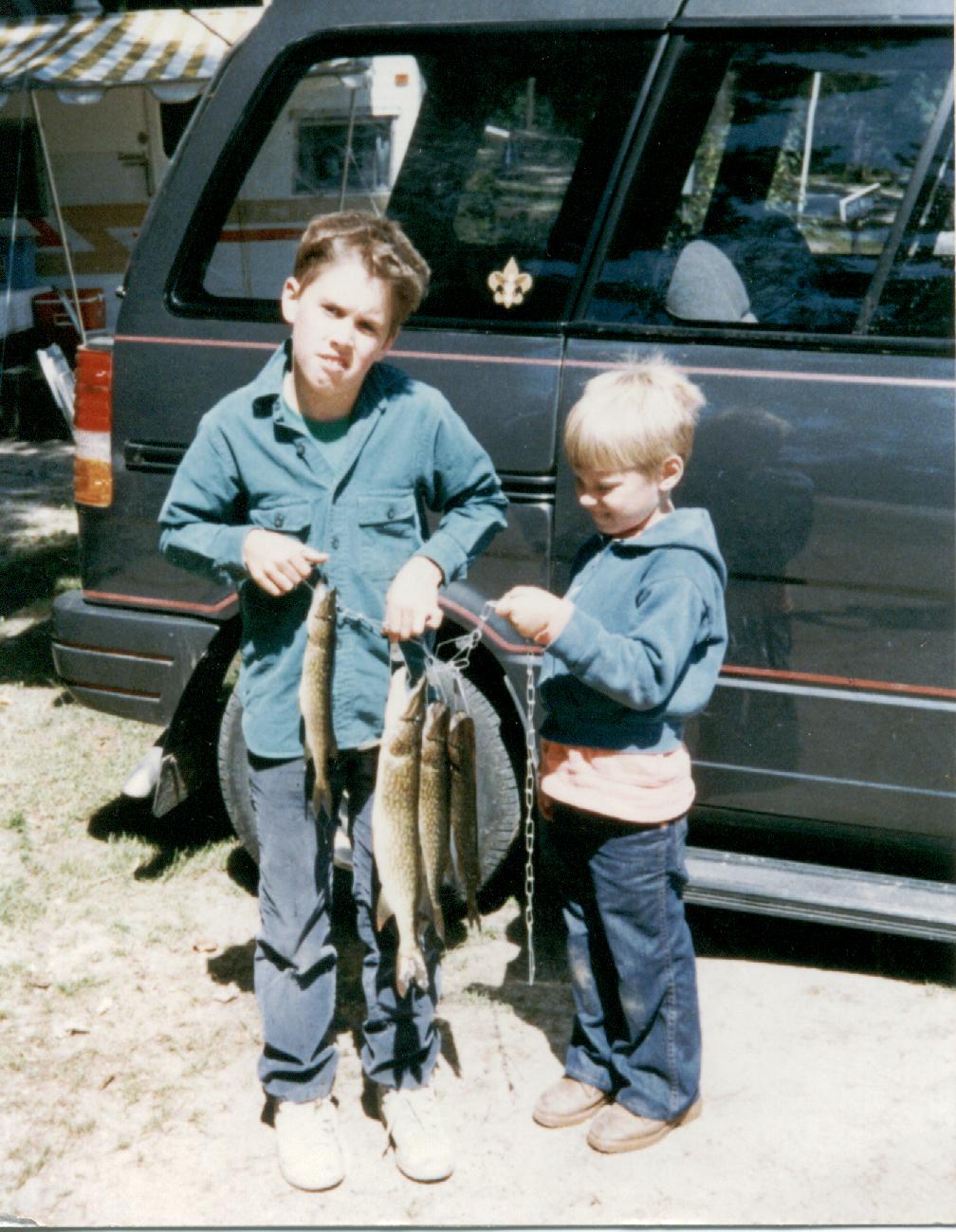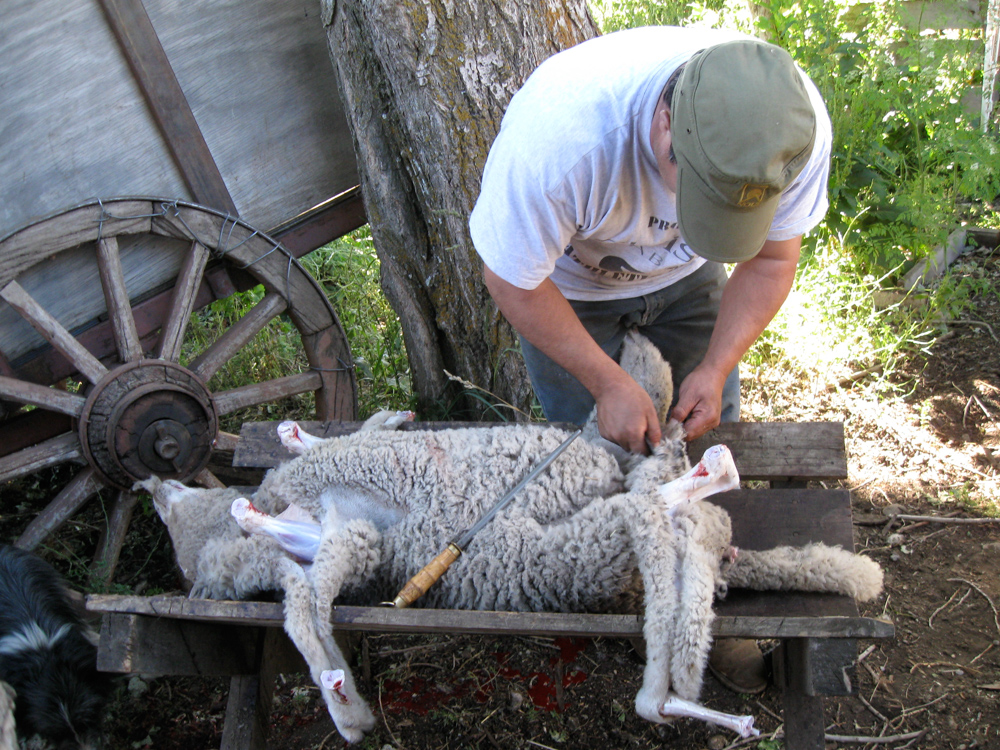Editor’s Note: This piece evolved from some prompts I had in a writing class I took two years ago from author Katherine Standefer. Pieces of the current news coverage have led me to revisit it.
Content Warning: this is a rumination on killing and killings of various sorts, from mass shootings to fish to ants to conflict minerals.
I don’t remember how I learned to kill. More exactly, I don’t entirely remember the techniques used versus who taught me—that I remember. Mr. Cote taught me how to kill.
Richard Cote was dad to my best friend Jake. Their family lived 1/4 mile up the hill across the tracks. The winding, maple lined road led past the driveway to the brown single-wide with a mud room and a two car garage. The yard was carved out of the trees and into a hillside. Jake had a snowmobile and guns and a backyard as big as the Great North Woods. If so inclined, I could get to the Cote’s through hardwoods and firs via trails and paths that at one point were etched in stone in my mind; the years now tell me the stone was Moenkopi; soft, fragile to time. Mr. Cote taught me to shoot, how to fish, and, gave me my first, life changing, Backpacker Magazine. Cold winters had us sitting in the bob house, waiting for the flags on our traps to go up. We’d run out, reel in the pickerel, stab it in the back of the head, break its back, or just cut the head off before cleaning it and throwing it in the fry pan. Some we took home. In the summers we would troll for pike or lake trout. If I didn’t know already, I am pretty sure he taught me how to kill, at least intentionally.
My grown up adult self owns a 11,000 square foot lot on a cottonwood lined street on Lander’s north side. A family of five lives next door on a smaller lot and in a house with less space than mine. Jonah is eight, but quick to tell you he is going on nine. Innocent and cruel, receptive yet brutally honest, he kills all things; all but those he deems worthy. Ants and bugs: the lucky ones are collected, dead or alive, in his room; the unlucky smooshed by a foot or hammer onto and into the ground. In shorts and no shoes, a tee shirt loose around a still boney, knobby body, he carries a rock down the sidewalk after an injured bird. “I’ll dispatch of it” he says eagerly to Abby as the small songbird flutters and flits from concrete to weeds, from dandelion grass to unswept sidewalk. “No Jonah” she says resigned, knowing, exasperated. I take it in with a side eye. She follows, he chases; the muted gray wings push forward but provide no lift, no flight, no escape.
Jonah and his older brother and their dad will go hunting again this fall. Last fall, in his first season, his brother came home with a deer; their dad did as well. It hung from their swings for several days as chickens pecked through the grass underneath it and then it filled their freezer. Killing came with a purpose on that day. Their dinner last night of fried eggs and deer steaks is ripe with the knowledge of land to table. At 9 years Jonah knows that killing has purpose.

Maybe I knew how to kill before Jake and I met, but if I did, it would’ve always just been there, been a part of me, instinctual, not a formal, or even informal education. Bugs, snakes, etc, just like Jonah. I did my share of drowning worms; catching one thing by killing another is a subtle message of priorities and sacrifice and playing God. I fished, using a red and white bobber that floated on the surface till it didn’t. We would catch the Centrarchidae, the flat, ray finned fish of the warm waters of Gumpus Pond. I was digging up worms and then piercing them before drowning them with my Zebco fishing pole; then traumatized sunfish I caught, wheezing and gasping, would be held up for a picture on the end of the bent rod, hook ripping at their innards. They would swim off, battle weary, sideways, to fertilize the bottom with their remains. My dad didn’t like fish. He only took me fishing, never taught me to kill the fish, just the bait; he taught me to torture.
Today, I don’t remember the acts of killing fearing me; the fears of being killed however—mass murdered actually—permeate my earliest memories. Fillet-o-Fish and Happy Meals are mere trivial details that stuck around, groupies to the Fear, clinging loosely like the long, white, two red striped tube socks I would wear that sagged on my skinny legs. The Fear takes me back to a summer day at the McDonalds in a neighboring town and how a restaurant 3000 miles away in San Ysidro, California represented one 10 miles away from my privileged, colonial, Bush Hill home. Garbled, static filled memories of hearing about people hiding under tables and in refrigerators while a killer opened fire gave me fear of going, of being there; thoughts of escape routes and “what would I do?” pervaded my six year old brain even as I played with a plastic Hamburgular toy; I wondered if hiding in the big ball pit for an hour would keep me from harms way or would I suffocate.

Later, clad in work boots and corduroys with small, smooth iron-on patches covering the knees, I stood in the yard staring up at the wild blue yonder, scared that someone could hold a firearm and take aim at a jet liner and bring it down, that anyone with a radio in a piece of luggage could blow up a plane, that anybody flying over foreign airspace was a target.
I wonder, if in these impressionable, formative moments of fear and death, fear of it happening to me because of the death of others, I began seeing power and control in the offensive, or at least in being defensively prepared.
As I grew out of—or rather maybe, into—my tube socks, my privilege let me grow out of my fears of being killed. Despite growing up in an era of increasing school shootings, I mostly was sheltered from those pieces of news. I elevated and was absorbed by the people that defended the innocent, the people that did the sanctioned killing. Wooden firearms, some painstakingly replicated from line drawings in the Encyclopedia Britannica, adorned the walls of the basement: Kalishnakov, sawed off .12 gauge, M-16, AK with a folding stock, the HK45, a SAM launcher, the M76 Smith & Wesson, etc. Camouflage and BDUs hung on flimsy plastic hangers in the closet and GI Joes littered the floor, wounded from battle and forgotten by sunny weather. Confederate Flags adorned the roof of all our replicas of Bo and Luke’s 1969 Dodge Charger. Killing was everywhere, lurking on or just below the surface of movies, toys, and activities. And it never went any further. I never acted on it; despite my appearance and my proclivities toward militias, weaponry, and dungeons and dragons, it never crossed my mind that I should cross that line.
And crossing that line looks different for everyone. Without proper guidance, it is easy to see how the lines of killing, power, and defensiveness get blurred. Terrorists were representative of their countries, their religion, their skin color. Fears of being killed by exploding airliners, whether shot down by Stinger missiles or blown up by Libyans with bombs or Russian jet fighters or even friendly fire were reinforced by the daily news. Communists were the bad guys, terrorists too. Whether The Assassins of Hardy Boys fame or the Libyans of Back to the Future and Pan Am Flight 103 or the PLO or M19, terrorists were brown people, but the Commies, they were always white people, like the Nazis. I shot a lot of Nazis too, particularly when pretending to be Indiana Jones, yet that didn’t stop me from perpetuating hate through ignorant glorification of their atrocities.
At some point I grew out of the games of killing but decades passed before I recognized the tacit approval of killing that comes with my own daily actions. Death and killing, even as I live and laugh, is inescapable; it is everywhere, all the time. I endorse it by eating meat, by buying electronics, by consuming petroleum products; conflict minerals, conflict resources are almost inescapable. I endorse it by willfully turning the other direction and pretending not to see, and in that, try to shrug that burden off my shoulders—only to have it caught and carried by those with less privileged identities, those existing in intentionally exploited communities.

By living we kill. There is no way around it. We eat. Even vegetables were once alive. Author Gary Snyder once wrote about a Wasco Indian logger who stopped cutting trees and sold his chainsaw because he couldn’t bear to hear them scream. Yes, science has shown that plants can emit a scream when cut; unlike humans, plants do not necessarily have nervous systems, thus, as far as we know don’t feel physical pain.
I’ve never HAD to kill, at least not in the immediate sense, but it has always been there. And there is immense privilege in that. I chose to NOT join the military because I could hold the burden of college loans. Even after 9/11 when I went back and talked to recruiters, I again chose not to. Others see the military and all that it offers as a way out, a lifeline, a way to better themselves and to be of service. But my circumstances didn’t dictate that, though in those moments, it was always a viable option that would have interested me; in this lifetime it seems, the current path won out. I’ve never had to hunt or fish to put food on the table. I have never had to defend myself or my loved ones from imminent harm. Killing, is not part of my daily experience.
At some point along the way I turned a corner. It wasn’t sharp, it was a broad curve where I went from making fun of exploited communities to not giving a shit to actively working, in my own small way, to bring positive change to the world. Somewhere along the way I learned and developed empathy and at this juncture I can’t identify where or when that was.
Now I rest, sitting on the two concrete steps of my eastern doorway and sip on a store-brand bubbly water The awning and house provide shade from the afternoon sun. Jonah stares idly at the ground, ears flagging out from his short hair and ball cap, mindlessly targeting ants. “Why are you killing those ants Jonah?”
“Because they are gross” and after some pause “I’m bored.” A moment passes.
“But what about the ones in your ant farm?” I ask. “How’d they get so lucky?” Another moment passes, I can’t tell if it is quiet contemplation or he is just ignoring me.
“Yeah I guess you are right” he says quietly, looking down, shy in our way of talking as he continues to stomp and squish with his slip on Nautica athletic shoe. He pushes down his toe, twisting his knee back and forth while we share space in silence, just killing time.
Featured Image: A Patagonian sheep being cooked on a fire.

Be First to Comment